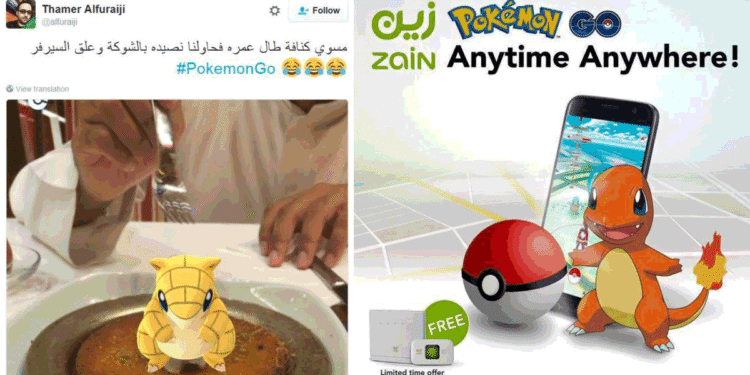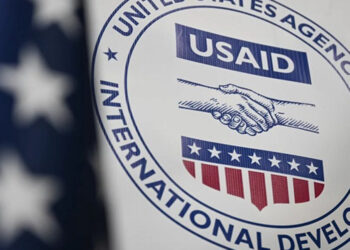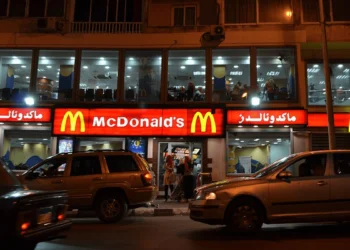I wanted to write on something fairly light and fun today in light of recent the Middle East and Europe events. So, today I wanted to shine a light on Pokemon Go, the augmented reality mobile app that has become a global sensation (and if you’re asking what Pokemon Go is, where have you been for the past two weeks?). While Pokemon Go hasn’t been officially introduced into the Middle East, people are already playing the game here.
Advertisers and brands are also reacting to and using the sensation to market their products.
Probably first out of the blocks were, unsurprisingly to me, the Saudis. Two of the Kingdom’s telcos put out adverts promoting the craze, which isn’t surprising considering that you need a mobile and a data connection to play the game.
Saudi telco Zain became the first household brand to use Pokemon Go when it ran this advert across its social media channels early this week. Saudi Telecom ran this artwork the same day as Zain’s ad. The ad says, “with our network, we guarantee you’ll be able to catch’em all, but we can’t guarantee where!”
Other brands have also looked to leverage off the lovable Japanese characters. Cab booking service Careem ran out an ad, as did Jordan Tourism. The game uses geotargeting to get people walking around a physical environment such as a city, and brands whose services include travel and tourism (or any location-based product) fast realize the potential of getting players to visit their premises (or even country) to hunt the digital creatures.
The UAE-headquartered cab-hailing service Careem has leveraged Pokemon Go to promote its service and give gamers a discount. Even Jordan’s Ministry of Tourism has jumped on the Pokemon Go craze to get visitors to go and take a look at Amman’s Citadel.
Users have also been having fun and sharing their own experiences online. Some have been sharing their experiences, including one apparently from the front lines in Iraq and others in more mundane locations, including finding a Pokemon on top of a plate of Kunafe.
It’s enough to put you off your dessert! A Pokemon on top of a plate of Kunafe (image thanks to Samer Batter). This image is apparently from the front lines in Iraq, which probably isn’t the safest place to hunt Pokemon.
Local media have picked up the craze and people’s reaction to it in the region. Reports have circulated that people have ventured into all sorts of places as part of the game—two cartoons below best sum up that sentiment.
With his phone in his hand and an image of a Pokemon monster on the screen, the caption reads, “finally we see you at the Mosque.” (image thanks to Yaser Al Amoudi) Saudi cartoonist Abdullah Jaber came up with this image of how game players are so engrossed in the game that they don’t notice their surroundings
The craze hasn’t been without controversy. According to Gulf News, Al Azhar, Egypt’s top Islamic institution, has condemned the craze about Pokemon Go as “harmful mania.” “If such a game can deceive youngsters, I do not know where the minds of adults have gone. According to Gulf News, they can be hit by a car while being busy searching for Pokemon,” said Al-Azhar’s Deputy Abbas Shuman. Al Arabiya reported that Egyptian cabinet spokesman Hossam al-Qawish said an investigation into the game’s dangers was taking place. The spokesman added that the government was also considering new regulations to impose online games to limit possible threats to national security.
In addition, Gulf News reported that the UAE’s Telecommunications Regulatory Authority (TRA) has warned that criminals could exploit the popular Pokemon Go mobile game. Kuwaiti authorities have also warned against those who take photos of sensitive locations in the country. Brands promoting Pokemon have also been targeted, with the likes of Dominos Pizza and others called into question by those who consider Pokemon to be a work of the devil (if you don’t believe me, see below).
Dominos Pizza’s efforts to use Pokemon as part of marketing were called into question by one user, who claimed Pokemon were tools of the devil against Islam. The user told Dominos to change its marketing or risk angering the public.
There’s no doubt that the Pokemon craze will continue for some time to come and will only become more intense/insane when the app is officially launched in the Middle East. Pokemon advertising has been used smartly to get a younger audience to engage with traditional organizations such as museums and promote small businesses. Let’s hope that marketers here are just as savvy whilst being aware of local sensitivities. If you’re not already doing it, get ready to catch some Pokemon adverts in your vicinity soon!
And as an extra treat, here’s one television news clip on Pokemon from Kuwait, with a particular focus on how it’s turning youth into addicts.











